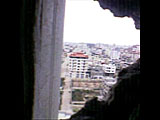Gaza Allegations Unaddressed
By Dominic Moran for ISN
Revelations by Israeli troops who served in the military's December-January operation in Gaza of unwarranted civilian killings has raised significant media interest domestically without establishing the basis for a genuine investigation of alleged malfeasances and atrocities.
Disturbingly, a video played by Israel's Channel 10 on 21 March showed a company commander telling his troops in an external page address just prior to entering Gaza: "If someone approaches us unarmed shoot in the air. If he keeps going, that man is dead."
The unwarranted killing of an unarmed elderly woman and of a mother and two children are also recorded in the testimonies of soldiers who spoke at an event sponsored by the Yitzhak Rabin pre-military program. Another speaker external page revealed that in one case an order was given to clear buildings floor-by-floor, killing everyone inside indiscriminately, after a warning was given residents to clear that sector of Gaza City.
It is important to note that Hamas is also accused of significant rights violations including the use of civilians as human shields and extra-judiciary executions - the latter both during and after the conflict.
It is apparent from the Israeli soldiers' testimonies that significant confusion and variations existed concerning both the nature of their rules of engagement and understandings of Gaza society, with the media-sponsored impression of near blanket support for Hamas seemingly rubbing off on external page attitudes toward the civilian population.
The timing of the release of soldiers' testimonies was predictable coming a couple of months after the fact (some were recorded in February but not publicized), with political and popular passions over the conflict - artificially maintained through the period of the elections and initial coalition formation - cooling.
The much-heralded popular consensus among Jewish-Israelis on the just nature of the Gaza operation has given way somewhat, with a reversion to a general disinterest in the Palestinian conflict beyond its immediate impact on personal and family security. The atrocity allegations, while shocking to many Israelis, have not created a wider clamor for redress.
There was a widespread impression in Israel that the Gaza operation was an effort by the military and government to re-establish Israel's deterrent capacity in light of the purported failures of the July-August 2006 Lebanon conflict.
Some on the Israeli left allege that the occupation has led to a brutalization of society whereby soldiers engaged in the largely police action of ongoing anti-militant operations in the West Bank (arrest raids, daily low-level clashes, security checks) return traumatized or hardened in their attitudes toward the Palestinians.
The source of the initial revelations concerning alleged atrocities during the Gaza operation is instructive. The Rabin program is considered close to the Zionist center-left and the kibbutz movement. The ideological propensities of these pre-service and military programs (some of which involve a mixture of Torah study and active duty or training) reflect the divisions within wider Jewish-Israeli society between right and left and national-religious and secular.
In recent years the military has become an important site of struggle in the Jewish-Israeli culture war over the nature of the Jewish identity of the state and the relation of the state and army toward biblically-mandated Eretz Yisrael.
Under its current leadership, the military rabbinate has openly pushed religious programs inside the army clearly aimed at steering soldiers toward Orthodox religiosity (as defined by the right of the national-religious movement) and latifundist and openly militant positions regarding the territories in which they serve and the population thereof.
Disturbingly, materials distributed to soldiers during the Gaza conflict reportedly equated the operation with a holy war. This concept has little resonance in Jewish tradition and is itself a bastardization of the peaceful message of the preeminent sage of religious Zionism Rabbi AI Kook.
It is important to note that the extension of the Jewish-Israeli culture war into the military and progressive shifts towards a greater number of national-religious settlers within the officer corps and elite units are not the key factors motivating changes in modes of military behavior or a general disinterest in alleged Gaza war crimes. The national-religious community is just not that influential
It is the failures of recurrent peace negotiations and ongoing Palestinian militant violence (seen as a constant by many Jewish-Israelis) that have played a formative role in the progressive distancing of the Palestinian experience under occupation from Jewish-Israeli consciousness.
As the initial impact of the soldiers' testimonies fades, the pressure on the military is easing. While promising a probe, the IDF has botched its response to the allegations. It initially denied that such material had been passed on to them - revealed as a lie – before seeking to massage the figures on civilian deaths.
There has been no commitment to a wider review of the implementation of rules of engagement during the conflict, or to address the progressive easing of restrictions fomented by the IDF's legal department, which has often acted retroactively to whitewash controversial military actions in recent years.
It remains unclear whether any Israeli soldiers will charged for their role in a variety of purported incidents that ranged from graffiti and vandalism to the use of a child as external page human shield and shooting of civilians and external page medical staff.
The failure to address both the strategic and humanitarian impact of the operation raises profound concerns given the hard right hue of the incoming Israeli government and prime minister designate Binyamin Netanyahu's electoral external page pledgeto overthrow Hamas rule in Gaza.
With lessons apparently going unlearned, the dangers of a repetition or, indeed, a devastating escalation are very real.
